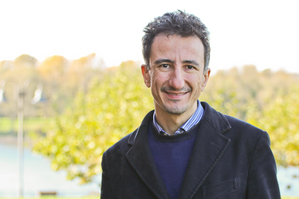Assoc. Prof. Dr. Enrico Terrone
Università degli Studi di Torino
Curriculum Vitae
Enrico Terrone studierte am Polytechnikum Turin (Politecnico di Torino) und erlangte dort den Bachelorabschluss in Elektroingenieurwesen. Von 2008 bis 2012 lehrte er Filmgeschichte und -kritik an der Universität Ostpiemont (Università del Piemonte Orientale) und war von 2011 bis 2013 Doktorand im Fach Philosophie an der Universität Turin. 2013 nahm er zudem Studienaufenthalte an der McGill University, Montréal (bei Prof. David Davies) und an der University of Sheffield (bei Prof. Robert Hopkins) wahr. 2014 wurde Enrico Terrone mit seiner Dissertation „Instances of Cinema. An Ontological Account of Depiction“ an der Universität Turin promoviert und erwarb zudem die Lehrbefähigung (National Scientific Qualification) als Associate Professor für Filmwissenschaft. Zurzeit ist er Post-doctoral Fellow am Laboratory for Ontology (LabOnt) am Fachbereich Philosophie der Universität Turin. Als Philosoph befasst er sich vor allem mit der Ontologie und Ästhetik des Films. Von Oktober 2014 bis Januar 2015 war er Fellow am Käte Hamburger Kolleg „Recht als Kultur“.
Research Project
Filmmaking the Social World
In contemporary analytic aesthetics, film philosophy has been developed as a methodology for the use of films as philosophical resources. So far, film philosophy has mainly focused on ethical and metaphysical themes, while social ontology has been overlooked. Yet social ontology is an especially well-suited area for film philosophy, since social facts such as love, friendship, family, law, power, and crime are the main topics of the stories told by films. The project shall link film philosophy to social ontology by addressing two issues. First, how social facts are represented in films. Second, how films contribute to shape social facts in the real world. Some films will be selected as case studies in virtue of their capacity to exemplify the construction of social facts. The ultimate purpose is to exploit film philosophy to test the explanatory power of some key notions in social ontology, viz. collective intentionality (cf. Searle 1995 and 2010), documentality (cf. Ferraris 2012), enforceability (cf. Derrida 1994), and normativity (cf. Zaibert and Smith 2007).
Selected Publications
- Filosofia del film, Rom: Carocci 2014.
- Normativity of the Background (zus. mit Daniela Tagliafico), in: Perspectives on Social Ontology and Social Cognition, Series: Studies in the Philosophy of Sociality, Vol. 4 (Hg. von Mattia Gallotti und John Michael), Dordrecht: Springer 2014.
- The Digital Secret of the Moving Image, in: Estetika: The Central European Journal of Aesthetics, LI/VII, 2014, Nr. 1, S. 21-41.
- Traces, Documents, and the Puzzle of ‘Permanent Acts’, in: The Monist, 97, 2, 2014, S. 161-178.
- Wittgenstein’s Picture Theory of Pictures, in: Aisthesis, VI, 1, 2013, S. 275-290.
- Filosofia delle serie Tv. Dalla scena del crimine al trono di spade (zus. mit Luca Bandirali), Mailand-Udine: Mimesis 2012.
- Connecting Worlds. Mimesis in Narrative Cinema, in: Mimesis: Metaphysics, Cognition, Pragmatics (hg. von Gregory Currie, Petr Kotatko und Martin Pokorny), College Publications, London, 2012, S. 465-479.
- Il sistema sceneggiatura – Scrivere e descrivere i film (zus. mit Luca Bandirali), Turin: Lindau 2009.
- Nell’occhio, nel cielo – Teoria e storia del cinema di fantascienza (zus. mit Luca Bandirali), Turin: Lindau 2008.


